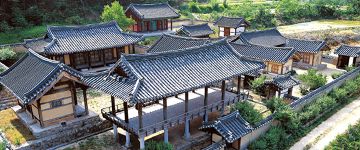안동 화천서원
| 안동 화천서원 Hwacheonseowon Confucian Academy, Andong |
|
 "화천서원", 안동하회마을. |
|
| 대표명칭 | 안동 화천서원 |
|---|---|
| 영문명칭 | Hwacheonseowon Confucian Academy, Andong |
| 한자 | 安東 花川書院 |
| 주소 | 경상북도 안동시 광덕솔밭길 72 (풍천면) |
| 지정(등록) 종목 | 시도기념물 제163호 |
| 지정(등록)일 | 2009년 11월 23일 |
| 분류 | 유적건조물/교육문화/교육기관/서원 |
| 시대 | 조선시대 |
| 수량/면적 | 1곽(8동) |
| 웹사이트 | 안동 화천서원, 국가문화유산포털, 문화재청. |
|
|
|
해설문
기존 국문
이 서원은 겸암 謙庵 류운용 柳雲龍1539~1601 선생의 학덕을 흠모하던 지역 유림들이 선생의 위패를 모시고 인재를 양성하기 위하여 정조 10년1786에 건립되었다.
그후 동리東籬 김윤안金允安과 졸재拙齋 류원지柳元之를 추가로 배향하고 100여년 동안 봄가을로 향사를 지냈다. 그러나 1871년 흥성대원군의 서원 철폐령에 의해 강당과 주사만 남기고 훼철됐다. 서원의 훼철을 아쉬워하던 후손들이 1966년부터 기금을 모아 유림들의 공론으로 1996년에 복설하여 지금의 모습을 갖추었다. 화천서원의 문루인 지산루地山樓에 올라 밖을 내다보면 넓게 펼쳐진 모래사장과 굽이쳐 흐르는 낙동강이 한눈에 들어온다.
수정 국문 2020
화천서원은 조선 중기 때 문신이자 학자인 류운룡(柳雲龍, 1539~1601)을 모신 서원이다. 류운룡의 학덕을 흠모하던 지역 유림들이 1786년에 세웠다.
1803년 류운룡과 류성룡의 제자 김윤안(金允安, 1562~1620), 류성룡의 손자이면서 류운룡의 학문을 계승한 류원지(柳元之, 1598~1674)를 추가하여 제사를 지냈다. 그러나 1871년 흥선 대원군이 서원 철폐령을 내리면서 강당과 관리동만 남기고 헐어서 치워버렸다. 이후 후손과 유림들이 1996년에 복원하였다.
서원은 정문, 강당, 동재와 서재, 내삼문, 사당으로 구성되어 있다. 강당인 숭교당은 마루를 중심으로 양쪽에 방이 있다.
화천서원의 문루(門樓)*인 지산루에 올라 밖을 내다보면 넓게 펼쳐진 모래사장과 굽이쳐 흐르는 낙동강이 한눈에 들어온다.
- 문루: 궁문, 성문 따위의 바깥문 위에 지은 다락집.
영문
Hwacheonseowon Confucian Academy, Andong
Confucian academies, called seowon in Korean, are private education institutions of the Joseon period (1392-1910) which usually combined the functions of a Confucian shrine and a lecture hall.
Hwacheonseowon enshrines the spirit tablet of the civil official and Confucian scholar Ryu Un-ryong (1539-1601). It was built by local Confucian scholars to honor Ryu for his academic achievements and virtuous deeds.
Born in Hahoe Village, Ryu Un-ryong was a disciple of Yi Hwang (1501-1570), one of the most eminent Confucian scholars in Korean history. Ryu was renowned for his wise administration while in service. He served as magistrate of Punggi (in today's Yeongju) and governor of Wonju. After his death, he was posthumously promoted to Minister of Personnel.
In 1803, the spirit tablets of two of Ryu's disciples, Kim Yun-an (1562-1620) and Ryu Won-ji (1598-1674), were added to the shrine. In 1871, the academy was demolished following a nationwide decree to shut down shrines and Confucian academies. It was reconstructed in 1996 by Ryu’s descendants and local Confucian scholars.
The academy consists of a gate pavilion, a lecture hall, two dormitories, an inner gate, and a shrine. From the gate pavilion, a panoramic view of the winding Nakdonggang River can be enjoyed.